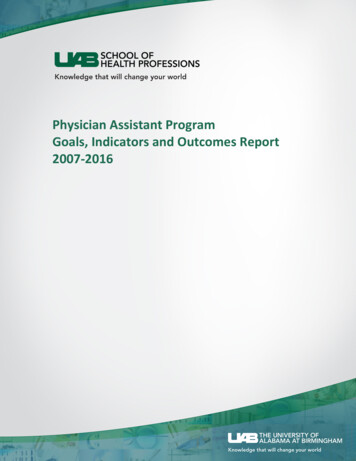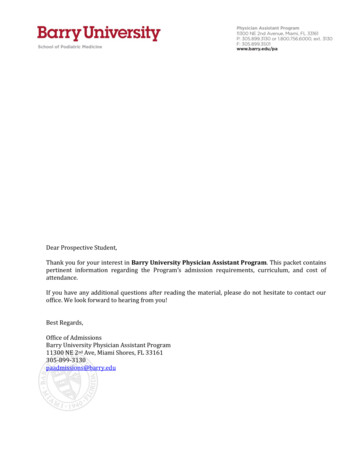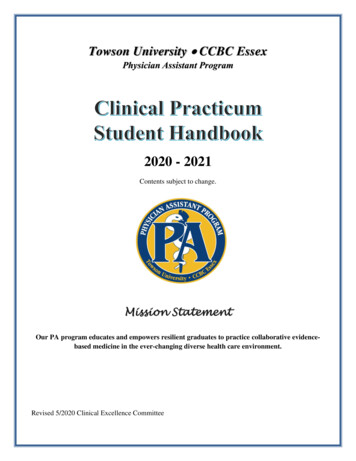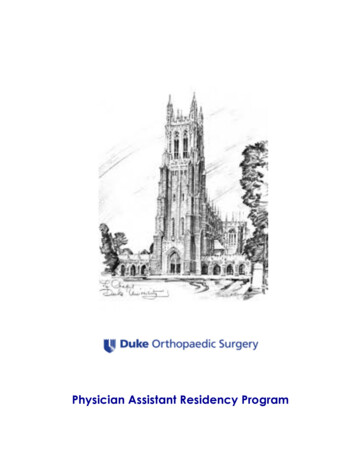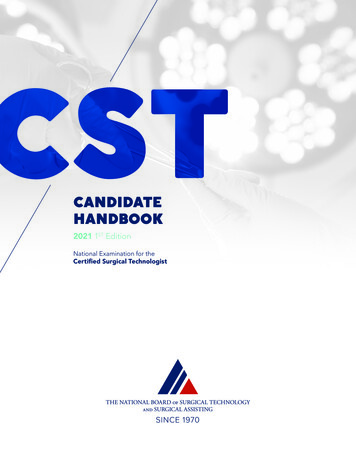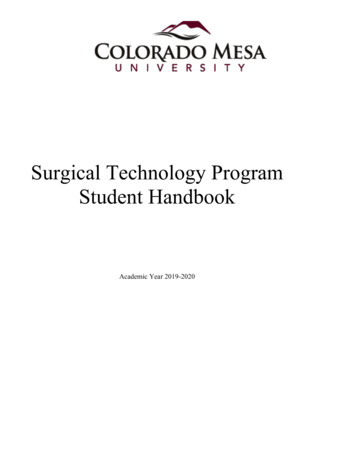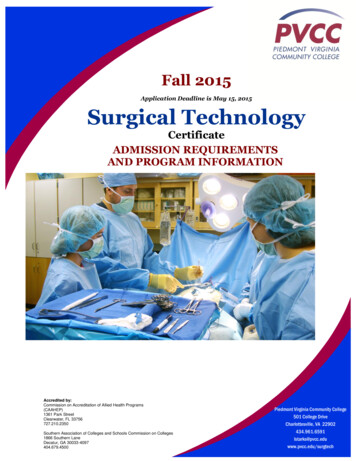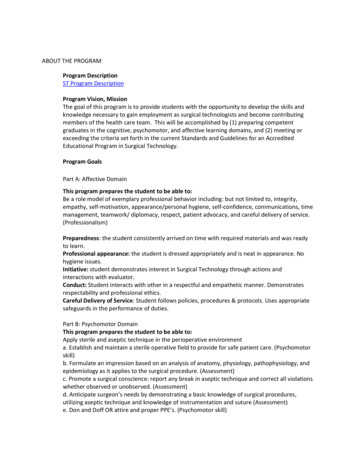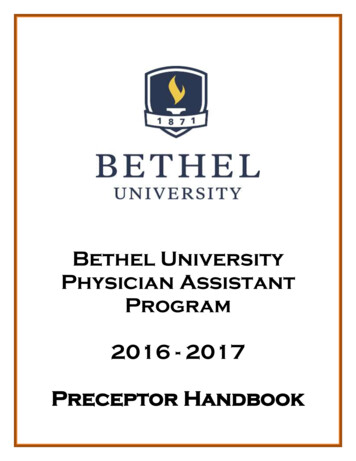
Transcription
PHYSICIAN ASSISTANT PROGRAMA SURGICAL FOCUSMaster of Science in Health Sciences for Physician AssistantsCLINICAL YEAR GUIDELINES & SYLLABUS2017-2018Dave Volpe, PA-CDirector of Clinical Education1
TABLE OF CONTENTSGeneral Guidelines for PA Students on Clinical Rotationspage 3Clinical Rotation Guidelinespage 5Rotation Specifics 2017 - 2018page 10Student Holiday Schedule 2017 - 2018page 12Clinical Schedule Class of 2018page 13Gradingpage 15Mid Rotation Site Visitspage 19Mid Rotation Evaluation Formpage 20Preceptor Evaluation Formpage 21Evaluation Explanationpage 22End of Rotation Meetingspage 25Rotation Specific Examspage 25Clinical Topic Paperspage 25History and Physical Case Write-upspage 26Case Presentationspage 26EXXAT PA Student Trackingpage 27Grand Rounds Presentationspage 27PAS 8000 Lectures and Activitiespage 28OSCE Practical Experiencespage 28Student Evaluation of Rotation Formpage 30Overall Objectives for Clinical Rotationspage 31EXXAT Logging Requirementspage 32Acknowledgement of Receiptpage 322
GENERAL GUIDELINES FOR PHYSICIAN ASSISTANT STUDENTSON CLINICAL ROTATIONSThe following represents the general guidelines and syllabus for the Weill Cornell Graduate SchoolMSHS Physician Assistant students while functioning on the clinical rotations at New YorkPresbyterian Hospital-Cornell Campus and/or affiliates. The material outlined in this syllabus issubject to change by the Program, Weill Cornell Graduate School, Weill Cornell MedicalCollege and/or Cornell University. Students are advised to refer to the WCGS MSHS PhysicianAssistant Program Student Handbook for specific Policies and Procedures with regard to theirresponsibilities as students in the MSHS PA Program.While functioning on the clinical rotations, the Physician Assistant (PA) student will be under thegeneral medical supervision of an attending physician and under the direct supervision of an attendingphysician, house staff physician or physician assistant assigned by an attending physician. Thepreceptor will see and examine every patient seen by the PA student. All invasive procedures will beperformed under the direct supervision of the preceptor. All laboratory, radiological and medicalrecord entries (i.e. notes, orders) will be co-signed by the preceptor prior to their implementation. PAstudents may not discharge inpatient, outpatient or emergency department patients until the supervisingpreceptor has seen the patient and discussed plans, instructions and/or follow-up care with the studentand patient.The following identifies the activities that a PA student may in all cases initially observe, secondlyassist with and thirdly perform while under the direct supervision of the physician or physicianassistant preceptor.1.Provide medical care under the direct supervision and co-signature of a physician orphysician assistant preceptor for the following: Perform a detailed and accurate history and physical examination (including rectaland pelvic examinations when appropriate). Initiate laboratory, radiologic and special examination procedures as appropriate forthe evaluation of illness. Initiate appropriate treatment based upon the presenting diagnosis. Instruct patients regarding therapy in a comprehensive and thorough fashion. Record appropriate information including admission notes, progress notes, intraoperative notes, post-operative notes and discharge summaries in the medicalrecord. Obtain review and counter-signature of the supervising physician on all medicalrecords. Write admission and/or other orders (including medications) while at New YorkPresbyterian Hospital-Cornell Campus and/or other affiliates where permitted.Obtain review and counter-signature of the supervising physician.3
General Guidelines Continued:2.Perform the following functions in the operating room under the direct supervisionof the designated preceptor: Prepare and drape the patient prior to surgery.Serve as an assistant to the surgeon during surgical procedures.Assist in closure of surgical wounds.3.Perform the following diagnostic and therapeutic procedures under the directsupervision of the designated preceptor Evaluate and participate in the treatment of non-life threatening, well-definedconditions. Initiate the evaluation of less well-defined or emergency conditions. Evaluate and participate in ACLS therapies. Endotracheal intubation, insertion of an oral airway, suctioning and use of bagvalve-mask ventilation devices and application of oxygen therapy. Venipuncture, arterial puncture, intravenous catheterization with fluid therapy andvenous cutdown. Intradermal, subcutaneous and intra-muscular injections and administration ofmedications in accordance with Hospital and/or Nursing guidelines. Cardiopulmonary resuscitation including use of AED, defibrillation and/orsynchronized cardioversion. Perform and interpret electrocardiograms. Fracture immobilization including application and/or removal of plaster casts. Gastrointestinal intubation (nasogastric tube insertion). Urethral catheterization in males and females. Thoracentesis and chest tube insertion for pleural effusion, pneumothorax or asappropriate during the emergency treatment of traumatic injuries. Wound care and suturing techniques. Lumbar puncture. Paracentesis and peritoneal lavage procedure. Central venous catheter insertion via subclavian, internal jugular and femoral veinapproaches. Assist in endoscopic procedures such as sigmoidoscopy.4.Further permitted functions of physician assistant students while on clinical rotations aswell as specific attitudinal and behavioral objectives may be found in the individualcore and elective clinical rotation goals and objectives.4
CLINICAL ROTATION GUIDELINES1. All clinical rotations are four weeks in length and begin on a Monday unless otherwise indicated.All decisions regarding the assignment of the core and elective clinical rotations are made by theClinical Coordinators. There will be no changes in the clinical rotation schedule unlessapproved by the Director of Clinical Education.2. Attendance on rotations is mandatory. Absences must be reported verbally to the supervisingclinical preceptor, assigned preceptor and the Program office by 9:00 am (messages may be left on646-962-7277). Students must also e-mail the Director of Clinical Education. Requests forplanned absences must be made in writing (Absence Request forms are available on-line in thelearning management system) a minimum of 2 weeks prior and submitted to the Director ofClinical Education for approval. However students are encouraged to submit Absence Requests asfar in advance as possible.It is recommended that any time (no matter the reason) missed on a clinical rotation be madeup. All missed time is to be discussed with the Director of Clinical Education. Failure to notifythe Program and/or preceptor of absences or failure to make up the missed time within 24 hours ofoccurrence may result in deduction of (5) points from the student overall grade for the rotation.Continuation of such behavior may result in disciplinary action. Time may be made up duringvacations and weekends or at the end of the clinical year with Clinical Coordinator approval.Missed time must be completed before a certificate of completion or a degree will be awarded.Students must provide written documentation of the time made up signed by the preceptor. TheDirector of Clinical Education must be made aware of when the time is being made up.Students are expected to leave the rotation when released by the preceptor. Students are notpermitted to leave the rotation based on a ‘shuttle’ schedule.A preceptor must be present while a student is on a rotation, therefore in the event that a studentmisses a day from a rotation due to preceptor absence, the student must notify the Director ofClinical Education to discuss the situation and ensure the required contact hours are met.Students must attend the rotation on the day prior to the End of Rotation meeting. Students whofail to do so will lose five (5) points from their overall grade for the rotation. If this subsequentloss of points results in a failure of the rotation, the rotation must be made up as outlined below.Holiday/Vacation Time off: Students are not permitted to miss the day prior to a scheduledholiday or vacation. Students are expected to be at their rotations until released by the preceptor.Many rotations require weekend and night call, therefore students should not assume that a Holidaywill include a concurrent weekend and must discuss the expectations with the preceptor prior tomaking any travel arrangements. Students are not permitted to miss the first day back from ascheduled holiday or vacation. As such, students are expected to make all travel arrangements toensure they comply with this requirement. Students are advised to leave themselves one extratravel day in case of travel delays and/or cancellations.Clinical Rotation Guidelines Continued:Time off limits: Students may miss up to five (5) excused days due to illness or other emergenciesthroughout the entire clinical phase of the Program; students may also request up to three (3)excused personal days throughout the clinical phase. Students may take no more than two (2) sickor personal days during a single rotation. Students may not miss more than 8 excused daysthroughout the entire clinical year.Students who are out from rotations more than two (2) consecutive days due to illness must submita medical provider’s note stating that they were seen and may return to rotations.5
Students who experience a significant illness or injury must notify the PA Program and report toStudent Health for evaluation for medical clearance prior to returning to clinical rotations.Medical clearance must state that the student is able to return to full duty.As a reminder, per the discretion of the Director of Clinical Education and/or the clinical preceptor,students may be required to make up any time missed during a rotation, no matter the cause.In the event of an extended absence (more than five (5) days missed in any given clinical rotation.Students who anticipate an extended absence should discuss their situation with the Director ofClinical Education prior to the absence to make appropriate arrangements for making up timemissed. Excessive absenteeism and tardiness may be grounds for dismissal from the Program perthe Standards of Conduct.3. Physician Assistant students are required to display their ID at all times and identify themselves asPA students. Students are expected to present a neat, clean, professional appearance at all times.Appropriate dress is required during the clinical rotations and rotation meetings as follows: short white jacket (with Graduate School seal on left shoulder) scrubs while on surgical rotations only man-tailored shirt and tie (men); blouse, tailored shirt or sweater (women) appropriate street clothes (colored or khaki trousers, slacks, knee-length skirts) closed toe shoes, clogs or white leather sneakers with appropriate hosiery; heels 2 inches denim skirts, jeans, shorts, camisoles, revealing or low cut tops, T-shirts and flip-flops areNOT acceptable attire. The wearing of green scrubs is prohibited in non-patient care areas, including the MedicalCollege library, cafeteria and laboratories. The wearing of green scrubs by all personnel in non-surgical patient care areas or specialcare areas is prohibited. The wearing of green scrubs outside of the Medical Center or to enter or exit the MedicalCenter is strictly prohibited. Inappropriately dressed students may be sent home from rotations and/or rotation meetingsand will lose 5 points from the overall rotation grade for each infraction. Students can always refer to the formal NYP Scrub policy available on the NYP website.4. Students are required to be available during a given rotation for a minimum of eight hours per dayand at least forty hours per week. Students should not leave at the end of the day until released bythe preceptor. Students are required to take call twice weekly on all rotations or as specified by theclinical preceptor. Students may be required to participate in overnight and/or weekend calldepending on the clinical site.Clinical Rotation Guidelines Continued:Students must attend Grand Rounds, patient rounds and case conferences when applicable tomaximize learning opportunities as directed by the clinical preceptor or rotation coordinator.General Guidelines for Surgical rotations: The culture of surgical education has developed suchthat very long hours are put in each day by the very dedicated members of a surgical team. Whilethe Program does not provide a strict limitation of hours for students when on rotations, it issuggested that a student work no more than 70 hours per week. However, it is up to the individualstudent to determine if he/she wishes to spend additional hours on the rotation. This guideline ismeant to be beneficial to the student’s education as it allows the student to work out his/herindividual schedule with the team and allows a student to stay late by personal choice. TheProgram feels that by imposing a specific work limit, it may impede learning and impose a barrierbetween the student and the team.6
5. Students are required to return to the Program for one day at the end of each clinical rotation forRotation Meetings (see schedule). Additional required callback days may be scheduled throughoutthe clinical year. During this time, students will take a rotation specific examination, participate inGrand Rounds presentations, perform practical examinations, attend lectures, etc. Attendance atall rotation meetings is mandatory. Failure to comply with this requirement will result in aloss of 5 points from the overall grade for that rotation. If this subsequent loss of points resultsin a failure of the rotation, the rotation must be made up as outlined below. Students should expectto spend the full day at the Program for the meetings and no travel plans should be made prior to7:00 pm on those days.6. As part of the Master of Science in Health Sciences for Physician Assistant Degree, students willparticipate in PAS 8000 Research Methodology and Application. This course will take placethroughout the clinical year. Students are required to complete all components of PAS 8000 asindicated by the Course Syllabus in order to be eligible for the certificate of completion and theMSHS degree. Specific guidelines regarding the PAS 8000 assignments during the clinical yearare outlined below and in the course syllabus.7. In order to facilitate communication, students are required to carry their Program issued pagers atall times during the clinical phase of the PA Program. Students are responsible for supplying theirown batteries for the pager. Lost or stolen pagers will necessitate that students pay a 50replacement fee. Written information and e-mail messages to students' Program issued WCMC email accounts (@med.cornell.edu) will also be utilized. Therefore students are advised to checkboth their Program e-mail accounts and the online learning management system on a daily basis.A student who cannot be reached on a rotation despite repeated attempts to be contacted will beconsidered absent from the rotation and the attendance policy above will apply.8. In the event that a student experiences any difficulty during a clinical rotation, he/she is advised tocontact the PA Program immediately. The student may be given suggestions to manage theproblem on their own or if necessary, a faculty member will intervene. It is the student'sresponsibility to notify the Program of the outcome whether or not resolution is achieved betweenthe student and preceptor.Clinical Rotation Guidelines Continued:9. All puncture wounds and other exposures to blood and body fluids should be reported immediatelyto the Student Health Service and the Program Office per the Physician Assistant Program StudentHandbook. As a brief review: Students are to immediately contact Student Health Services and the Physician AssistantProgram office for immediate guidance. Students should inform their supervisor of the event and initiate the exposure protocol asapplicable for that site. Obtain patient name; fill out any required incident reports, send blood for appropriate workup (choose ‘needlestick protocol’ on lab sheet if available to expedite process). Students are permitted to immediately leave the rotation site to obtain medical care at eitherStudent Health Services or the NYPH Emergency Department (after hours). Student Health Services will direct the care of the student and the follow up of the incident.10. In order to maximize the clinical learning experience, students must not be used to substitute forregular clinical or administrative staff while on clinical rotations nor may they be permitted toaccept payment for services rendered in connection with the performance of their clinical rotationduties. Students must notify the Program office immediately should they be put in such a position,or have any questions or other concerns.7
In addition, any student considering engaging in gainful employment or already doing so duringthe clinical rotations must make the Program Director aware of this. The appropriateness of suchemployment will be reviewed by the Program Director with the student in light of the student'spersonal academic history.11.Student Responsibilities / Honor Code: In order for students to be permitted to continue theirstudies at the MSHS PA Program, students must demonstrate a range of skills and abilities, such as,maturity, reliability, good judgment, a sense of responsibility and morality, sensitivity and compassionfor individual needs, the ability to synthesize and apply knowledge, and evidence that they are capableof becoming safe and effective physician assistants. Students must also assume responsibility for theintegrity of the content of the academic work performed and submitted, including papers, examinationsand reports.The following are examples of conduct that is not suitable for students at the MSHS PA Program andis subject to disciplinary action (including but not limited to verbal warning, written warning,probation, suspension (required leave of absence) and dismissal): knowingly or carelessly representing the work of others as one’s own;lying, cheating, or falsification of records whether personal or patient-related;using or giving unauthorized assistance in any academic work;restricting the use of material used to study in a manner prejudicial to the interest of otherstudents;purposely misleading or giving false information to another student;posting of confidential, inappropriate, unauthorized or copyrighted information (including butnot limited to, photos, images, text, audio, video, or lecture materials) on the internet (includingbut not limited to Facebook, blogs. LinkedIn, and others);otherwise committing a breach of academic and/or professional integrity;Clinical Rotation Guidelines Continued: repetitively or egregiously failing to fulfill the professional requirements and responsibilities ofa clinical rotation;committing an act of physical abuse or violence of any kind;disorderly and/or obscene conduct on campus or in the hospital facility or its affiliates;bullying (including but not limited to verbal, physical force or the use of electronic technology)which deliberately seeks to harm or humiliate another student, faculty, lecturer, administrativestaff or patient;obstructing, harassing or interfering with teaching, Program administration or patient care;including the use of information and communication technologies as a means of intimidation,harassment or unwarranted interruption;being repeatedly absent, unexcused, from a required course, rotation or end of rotationactivities;failing to respond in a timely way to communications (phone calls, emails or othercorrespondence) from the administration, faculty, course leadership or their representatives;failing to comply with directive given by supervision authority;unauthorized entry to or use of Weill Cornell or hospital facilities or its affiliates;theft of or negligent damage to Weill Cornell or hospital property or its affiliates;use, possession or distribution of controlled substances on campus or in the hospitalfacilities or its affiliates;unauthorized use and/or possession of alcoholic beverages in the hospital or Weill8
Cornell facilities or its affiliates;inappropriate use of the Weill Cornell seal, logo, name, symbol or facsimile.A student or group of students, knowing of any situation in which a violation of any of the standards ofconduct set forth above may have occurred is responsible for providing any such information inwriting to the MSHS PA Program Director. Faculty is similarly required to report a violation to theMSHS PA Program Director. Each student matriculated at the MSHS PA Program shall be bound bystandards of conduct described above and shall be presumed to be familiar with the above provisions.When a student’s conduct while matriculated at the MSHS PA Program is in violation of the StudentResponsibilities/Honor Code or raises a question about his or her suitability to practice medicine, thematter will be directed to the Committee on Promotion and Graduation for consideration andrecommendation of corrective disciplinary action.Any student who fails to adhere to the Student Responsibilities / Honor Code during the clinicalphase of the Program will be referred to the Committee on Promotions and Graduation forevaluation.12. Please refer to the Weill Cornell Graduate School MSHS Physician Assistant Program StudentHandbook for details of the guidelines and policies regarding professional expectations and termsof successful completion of the clinical year.9
ROTATION SPECIFICS FOR 2016 - 20171.The rotation schedule for the 2016-2017 clinical year includes 15 four-week clinical rotationsand students are required to do ten (10) Core supervised clinical practice rotations:PAS 7010 and PAS 7020:PAS 7030 and PAS 7040:PAS 7060PAS 7070:PAS 7080:PAS 7090:PAS 7100:PAS 7110:four week Internal Medicine Rotationfour week General Surgery Rotationfour week Primary Care Rotationfour week Pediatric Rotationfour week OB/GYN Rotationfour week Emergency Medicine Rotationfour week rotation in Geriatricsfour week rotation in PsychiatryAll core rotations must be done at New York Presbyterian Hospital and/or affiliated sites andwill be assigned by the clinical coordinators.2.The remaining five (5) clinical rotations (PAS 8010 – PAS 8050) are Elective supervisedclinical practice rotations. Students may choose from the currently available elective rotationsat New York Presbyterian Hospital and/or affiliated sites. Assignments will be made inconjunction with the preceptors and will be based upon availability as well as student academicperformance and professional behavior in the pre-clinical phase.Rotation sites may require additional documentation including but not limited to backgroundchecks, drug testing, supplemental applications and interviews for any student desiring toparticipate in rotations at that institution/practice. Students must complete all paperwork andprovide all documentation as requested by the deadlines indicated. Failure to do so may resultin a denial of the requested rotation. Elective rotation preceptors have the right to makedecisions about accepting students based upon the results of the application and/or interview.3.External rotations encompass both sites and preceptors not currently utilized by the MSHS PAprogram for supervised clinical practice. Students may do a maximum of one external clinicalrotation. The opportunity to do external clinical rotations is a privilege and is contingent uponapproval from the Director of Clinical Education, Program Director, and the UniversityCounsel’s office. In order to expedite the process, students are strongly encouraged to considerusing sites used by students in the past years. Students are advised that most external sites willrequire a background check. Students are responsible for this cost as well as all costs incurredin the course of arranging and participating in External rotations.The opportunity to do International elective rotations is contingent upon approval from theClinical Coordinator, Program Director, and the University Counsel’s office. Students may berequired to obtain appropriate immunizations (and must adhere to CDC immunizationrecommendations for international travel), submit additional paperwork and proof of separatetravel insurance prior to the start of such rotations. Students are responsible for all costsincurred in the course of arranging and participating in International rotations. The MSHS PAProgram reserves the right to mandate that a student return from an international site at anytime during the rotation.Rotation Specifics Continued:The opportunity to do external or international rotations is a privilege and as such warrantsexemplary professionalism, attitude and academic performance. Therefore, only students whoare in good academic standing and have demonstrated exemplary professionalism, attitude andacademic performance will be permitted to do external or international rotations. Prior topursuing an external elective rotation, a student must complete the Student Request to Pursuean External Elective Rotation form, which will be reviewed by the Program Director for10
appropriateness, and to determine if the student is in good academic standing and exhibits thecharacteristics outlined above. Once approved, the student may proceed with the process.Students wishing to do an external elective clinical rotation or an international elective rotationmust obtain the application package online in the learning management system. Students areresponsible for following all directions and ensuring all documents are completed and returnedto the Program office by the indicated deadlines.Applications for external rotations will be reviewed for approval once all components of theapplication are submitted. All requests and necessary paperwork for external rotations must besubmitted to the Clinical Coordinator no less than six months prior to the start of the requestedrotation date.4. Physician Assistant students are responsible for their own transportation costs to and from allclinical rotation sites including core, elective, external and international rotations.5. Students must comply with all health requirements of each clinical site including drug screeningwhere required. Students must be prepared to provide evidence of such compliance directly to theclinical site if requested. Students are advised to work with the Office of Student Health as the PAProgram does not have access to student medical records. Students are required to update allhealth information with Student Health Services prior to the start of the clinical year.6. Students must participate in all HIPAA training required by both Weill Cornell Medical Collegeand Graduate School and each clinical site. Students are expected to comply with all HIPAAguidelines. Failure to comply with HIPAA guidelines may result in dismissal from the Program.Students are not permitted to take photos/videos of patients. Students may not use their personalcell phones or cameras for this purpose. In the event that a student has taken a photo as directed bythe attending physician, these photos may only be shared with the members of the team. No photomay ever be posted or disseminated via a social network, website, e-mail or used in a publication.Students are reminded that all patient information is protected under HIPAA. Violation of thispolicy may result in the imposition of fines and sanctions and/or dismissal from the Program.7. Students are advised to minimize the use of cell phones on rotations. Students should not use theircell phones in patient care areas (including nurses’ stations).8. Students must participate in BCLS, ACLS, Infection Control, Child Abuse Reporting; Cornellrequired patient safety classes, evaluative examinations, EXXAT evaluations, on-line learningmodules and discussion groups and other in-service training or course specific activities as directedby the Program.Rotation Specifics Continued:Students must participate in additional training classes at as required by Weill Cornell MedicalCollege and Graduate School and each clinical site. Students must comply with these requests.Failure to do so will result in removal from the rotation and necessitate the student repeat therotation at the conclusion of the clinical year.9. Cornell University provides general liability insurance for all students while they are acting withthe scope of their duties in an academic program of approved medical instruction.Coverage afforded by the University’s professional liability policy covers students for approvedon-site and off-site locations. Off-site (external) locations must be approved by the Director ofClinical Education in conjunction with the University Counsel’s office prior to the commencementof the rotation.Any incident, either actual or alleged should be reported immediately to the PA Program office.11
STUDENT HOLIDAY CALENDAR 2017-2018Memorial DaySummer BreakIndependence DayLabor DayFall BreakThanksgiving DayDay After ThanksgivingChristmas DayNew Year’s DayMartin Luther King DayPresident’s DayMon, May 29, 2017June 19-23, 2017Tues, July 4, 2017Mon, Sep 4, 2017Sep 18-22, 2017Thurs, Nov 23, 2017Fri, Nov 24, 2017Mon, Dec 25, 2017Mon, Jan 1, 2018Mon, Jan 15, 2018Mon, Feb 19, 2018Students are not permitted to miss the day prior to a scheduled holiday or vacation or the day followinga holiday or vacation. Students are expected to be at their rotations until released by the preceptor.Students should not assume that a Holiday will include a concurrent weekend and must discuss theexpec
MSHS Physician Assistant students while functioning on the clinical rotations at New York Presbyterian Hospital-Cornell Campus and/or affiliates. The material outlined in this syllabus is subject to change by the Program, Weill Cornell Graduate School, Weill Cornell Medical College and/or Cornell University.



